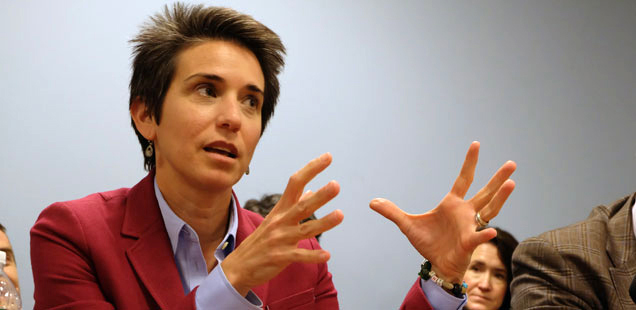Our weekly roundup of news found at the intersection of media, politics, policy and technology, from the Shorenstein Center and from around the web.
This Week at the Shorenstein Center
Amy Walter: The Current State of the Campaign. Amy Walter, national editor of The Cook Political Report, discussed possible outcomes of the 2016 presidential and down-ballot races, and what may lie ahead after Election Day.
Peter Hart: Trends and Demographics in the 2016 Election. Peter D. Hart, chairman of Hart Research Associates, a public opinion research firm that provides polls for NBC News and The Wall Street Journal, discussed the driving forces behind the 2016 presidential election, and the influence of voter demographics and public opinion on the race.
Voter Fraud, Perceptions and Political Spin: Research Roundup, from Journalist’s Resource.
News from Our Faculty & Fellows
Missing from the Debates: Climate Change. Derrick Z. Jackson, fall 2016 Joan Shorenstein Fellow, writes that the missed opportunity to ask about how the candidates would tackle climate change and a transition to clean energy is “an utter embarrassment to the American political process.”
Fixing U.S. Elections. Pippa Norris, Paul F. McGuire Lecturer in Comparative Politics, writes that gerrymandering, failures of the media, vulnerable technologies, and ballot access laws which restrict third party candidates are among the problems that have led to “an erosion of American confidence in the electoral process—despite the fact that voter fraud occurs very rarely.”
Freedom of Information in a Digital Age. Nick Sinai, Adjunct Lecturer in Public Policy, writes about the effort to bring FOIA up to speed in an age of tools like Slack and GitHub.
Election Coverage and Commentary
Criticism of the News Media Takes on a More Sinister Tone, from The New York Times.
Why Newspaper Endorsements Might Matter More in This Election, from The Conversation.
Trump, Clinton Supporters Differ on How Media Should Cover Controversial Statements, from Pew Research Center.
Media Vulnerable to Election Night Cyber Attack, from Politico.
As Threats Worsen, Here’s How to Stay Safe and Sane While Covering the Presidential Race, from Poynter.
Fresh Ideas
Can You Make Learning about Gerrymandering Fun? Fusion Teamed with Mobile Gaming Devs to Try, from Nieman Lab.
Washington Post to Cover Every Major Race on Election Day with Help of Artificial Intelligence, from The Wall Street Journal.
The New York Times Is Using a Facebook Messenger Bot to Send out Election Updates, from Nieman Lab.
Press Freedom
How the Committee to Protect Journalists Broke with Tradition to Protest Trump, from The Washington Post.
Filmmaker Arrested at Pipeline Protest Facing 45 Years in Felony Charges, from The Huffington Post.
Judge Rejects Riot Charge against Amy Goodman of “Democracy Now” over Pipeline Protest, from The New York Times.
Media Business
Across America, Corporate Ownership and Closures Are Leading to Vast “News Deserts,” from Poynter.
What If the Newspaper Industry Made a Colossal Mistake? From Politico Magazine.
While You Were Watching the Debate, Trump Just Launched Trump TV, from BuzzFeed News.
Why Trump TV Will Fail, from Recode.
Social Media
Electome From MIT Media Lab Uses Data to Capture and Analyze Social Media Conversations around the 2016 Presidential Election, from MediaShift.
As the Election Draws to a Close, BuzzFeed News Plans a Social Media Sprint to the Finish, from Poynter.
Hillary Clinton Gets a Snapchat Interview, but Donald Trump Doesn’t Want One, from Recode.
A Third of Pro-Trump Tweets Are Generated by Bots, from CNN.
Journalists “Bear the Brunt” of Rising Anti-Semitism on Twitter, Report Says, from Huffington Post.
Sign up to receive Media and Politics Must Reads in your inbox each week. Also connect with us on Twitter and Facebook for more updates.


